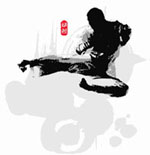|
Chapter 17. Questioning What is Right and What is Wrong "Isn't it that no distinction leads to abandonment?" "I just said you should overcome distinction."
Distinctive life makes the distinctive right and wrong. It is very important for Taekwondo man to make good judgement on what is right and what is wrong, which determines whether Taekwondo makes a lethal weapon or it fertilizes your life. As stated above already, Taekwondo itself is not a skill to rescue a man, yet rather, distinct from medicine or something like that, a skill to hurt and kill a man, so it ought to be used deliberately. Only in the extremely controlled use it can help achievement of contribution to society and offer everyone positive and rich meaning of life, as it is intended. It is just momentary that the temptation to try your trained killing skill without deliberation overwhelms you without notice though sometimes in your life, and it is also just momentary that you are determined to explode your violence under impulsive conditions. You can overcome this danger with the help of nothing but your trained and strengthened personality to control yourself under extreme conditions. Therefore, the right Taekwondo ought to include completion of good personality with development of skills. It is why the old masters never taught skills to those whose personality are not perfect from of old. Generally speaking, seriousness is necessary and essential in developing your personality. Thus TAEKWONDO, which requires development of personality necessarily, enforces you to be serious. Who would not be serious when he thinks of death in the killing skills. In this way, the morality and value of Taekwondo can never be obtained through denial of bloody spirit that lies in Taekwondo. Rather you will confirm them when you admit Taekwondo's bloody spirit with its dangerousness, thus when you know that you have to be careful and temperate. An old proverb says that those who construct themselves with the sword will be destroyed by the sword. However Taekwondo man never constructs himself with his fist, but with an ethical duty for justice, then uses his weapon, so he will not be destroyed by his weapon. Then where can you find the ethical oughtness that supports justice? Can you find such an objective standard for judgement, distinction of what is right and what is wrong? Yes, you can. It stands with no shape and no substance for man on the boundary
between man and nature; "respect what each man wants to do equally". It is
natural, both objective and subjective, and it is a matter of choice. The
saint king named the substance of Ethical oughtness "benefiting everyone widely( Thus right Taekwondo man, who considers man more important than anything else, when he uses Taekwondo, uses it not harming others but only deleting the bad in them. This implies the harmony of ethics and TAEKWONDO. Therefore, if a bad man cannot get up again after felled it is not because TAEKWONDO tried to kill him but because he cannot live without the bad in himself. Everyone deserve to be relieved but you cannot help this case, which is, if any, only limitation of Taekwondo. <footnotes>
1) I'm talking of ethics. To speak more precisely, I refer to
the objective criterion of morality; the ultimate foundation of morality. To
understand this problem you should know some historical story of this matter.
Let me tell you briefly.
|